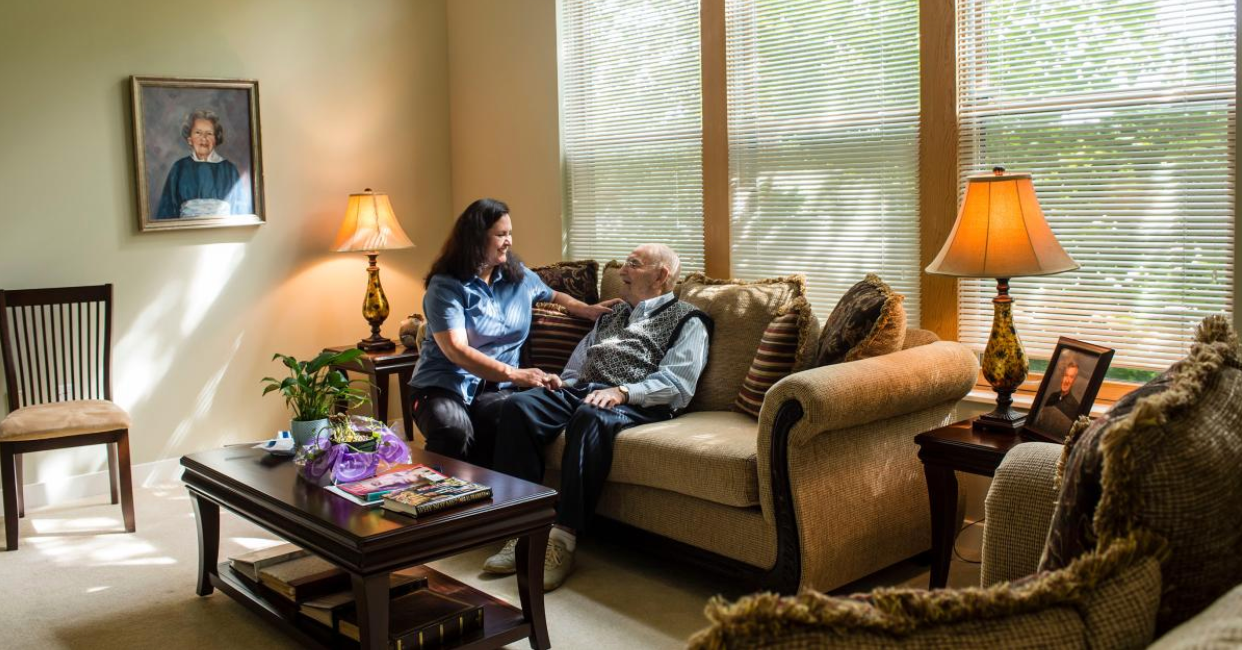Specialized Lewy Body Dementia In-Home Care
According to Johns Hopkins Medicine, diagnosing Lewy body dementia can be challenging, with an estimated 1.4 million Americans living with the disease.
What is Lewy Body Dementia?
According to the National Institute on Aging, Lewy Body Dementia (LBD) is a complex and challenging condition that affects over 1 million individuals in the United States. It is characterized by the abnormal accumulation of a protein called alpha-synuclein in the brain, leading to various cognitive, motor, and behavioral symptoms. At 7 Day Home Care, we understand the unique needs of individuals living with LBD, and we provide specialized in-home care services for those diagnosed with this condition in Manhattan, Queens, Brooklyn, Nassau County, and Suffolk County, New York. In this article, we will explore the causes, signs, symptoms, types, and in-home care available for LBD, offering insights and support for both patients and caregivers.
Understanding the Causes of Lewy Body Dementia
The National Institute on Aging further explains that while the precise cause of LBD remains unknown, ongoing research is shedding light on its underlying biology and genetic factors. It is known that the accumulation of Lewy bodies in the brain is associated with the loss of neurons responsible for producing crucial neurotransmitters—acetylcholine and dopamine. These neurotransmitters play vital roles in memory, cognition, behavior, and motor function. Age is considered the most significant risk factor for LBD, although certain diseases like Parkinson's disease and REM sleep behavior disorder have also been linked to a higher risk. While there is evidence of genetic variants associated with LBD, the majority of cases have an unknown cause.
Recognizing the Signs and Symptoms of Lewy Body Dementia
According to the Mayo Clinic, LBD manifests in a range of symptoms that can impact cognition, movement, sleep, and behavior. These symptoms may vary from person to person and often overlap with those of other brain diseases, making diagnosis challenging. Common cognitive symptoms include visual hallucinations, changes in concentration, and severe loss of thinking abilities. Motor problems may include muscle rigidity, tremors, and balance issues. Sleep disturbances such as REM sleep behavior disorder are also common. Behavioral and mood changes can encompass depression, anxiety, agitation, delusions, and paranoia. Additionally, LBD can affect the autonomic nervous system, resulting in changes in blood pressure, body temperature, and issues like urinary incontinence and constipation.
Types of Lewy Body Dementia and Diagnosis
According to Johns Hopkins Medicine, LBD includes two related diagnoses—dementia with Lewy bodies (DLB) and Parkinson's disease dementia. DLB is characterized by cognitive symptoms appearing within a year of movement symptoms, resembling aspects of both Alzheimer's disease and Parkinson's disease. In contrast, Parkinson's disease dementia initially presents as a movement disorder, with cognitive symptoms developing more than a year after the onset of motor symptoms. Not all individuals with Parkinson's disease develop dementia, and predicting who will is challenging. Diagnosis requires a thorough evaluation by a healthcare professional, taking into account symptoms related to thinking, movement, sleep, behavior, and mood. Providing a complete medical history and medication list is crucial for an accurate diagnosis.
Building a Care Team
- A neurologist specializing in dementia and movement disorders can be a valuable addition to the care team.
- Collaboration with primary care doctors, physical, speech, and occupational therapists, mental health professionals, specialized dementia in-home care agency provider, and palliative care specialists can enhance the overall care plan.
- Support groups offer a valuable resource for emotional and social support, allowing individuals and caregivers to share experiences and find practical solutions to challenges.
Specialized Lewy Body Dementia In-Home Care
7 Day Home Care is dedicated to providing specialized care services for individuals with Lewy Body Dementia (LBD) and their families in Manhattan, Queens, Brooklyn, Nassau County, and Suffolk County, New York. Our comprehensive range of LBD-focused services aims to enhance the quality of life for both patients and caregivers. Here is a list of the specialized LBD care services we offer:
- LBD Care Assessment: We conduct a thorough assessment to understand the unique needs and challenges faced by individuals with LBD, enabling us to create a customized care plan.
- Medication Reminders: Our trained caregivers assist with medication reminders, ensuring that individuals with LBD take their prescribed medications on time and as directed.
- Cognitive Support: We provide cognitive stimulation activities that are tailored to the individual's abilities and interests, helping to maintain cognitive function for as long as possible.
- Movement Assistance: Our caregivers offer support with activities of daily living (ADLs), including dressing, grooming, and mobility assistance, taking into account the motor symptoms of LBD.
- Nutritional Support: We offer meal planning and preparation services, ensuring that individuals with LBD receive a balanced diet that meets their nutritional needs.
- Fall Prevention: Our caregivers are trained to create a safe home environment, minimizing fall risks and implementing fall prevention strategies.
- In-Home Respite Care: We provide respite care for family caregivers, allowing them to take breaks and recharge while ensuring their loved one with LBD continues to receive quality care.
- Transportation: Our caregivers can accompany clients to medical appointments, therapy sessions, or other outings, ensuring individuals with LBD can access the care they need.
- Specialized Activities: Our caregivers engage individuals with LBD in activities that promote sensory stimulation and social interaction, helping to improve their overall well-being.
- Communication Support: We assist in facilitating clear and effective communication between individuals with LBD and their families, reducing frustration and misunderstandings.
- Emotional Support: Our caregivers provide emotional support and companionship, reducing feelings of isolation and loneliness often experienced by individuals with LBD.
- Coordination of Care: We communicate and collaborate as appropriate with healthcare professionals, including neurologists and specialists in dementia care, to ensure individuals with LBD receive the most appropriate and up-to-date medical care.
- End-of-Life Care: We provide compassionate end-of-life care for individuals with advanced LBD, offering comfort and support to both the patient and their family.
- 24/7 Availability: 7 Day Home Care offers round-the-clock care services, ensuring that individuals with LBD have access to assistance and support whenever it's needed.
Our specialized Lewy Body Dementia care services are designed to address the unique challenges posed by this condition, promoting the highest possible quality of life for individuals with LBD and providing much-needed support for their families. Caring for individuals with Lewy Body Dementia presents unique challenges, but with a comprehensive care team and tailored treatment plans, the quality of life for both patients and caregivers can be improved. At 7 Day Home Care, we are dedicated to providing specialized in-home care for those diagnosed with LBD in the New York area. While there is no cure for LBD, ongoing research offers hope for improved understanding, diagnosis, and treatment of this complex condition. As we continue to advance our knowledge, our commitment to supporting individuals and families affected by LBD remains unwavering. Call 7 Day Home Care, the most responsive team in Home Care today at 516-408-0034.
Brian Callahan
7 Day Home Care
For more information about Lewy body dementia
NIA Alzheimer’s and related Dementias Education and Referral (ADEAR) Center
800-438-4380
mailto:adear@nia.nih.gov
adear@nia.nih.gov
The NIA ADEAR Center offers information and free print publications about Alzheimer’s and related dementias for families, caregivers, and health professionals. ADEAR Center staff answer telephone, email, and written requests and make referrals to local and national resources.
http://www.alzheimers.gov/
http://www.alzheimers.gov/
Explore the Alzheimers.gov website for information and resources on Alzheimer’s and related dementias from across the federal government.
National Institute of Neurological Disorders and Stroke (NINDS)
800-352-9424
mailto:braininfo@ninds.nih.gov
mailto:braininfo@ninds.nih.gov
Lewy Body Dementia Association
404-935-6444
800-539-9767 (LBD Caregiver Link)
http://www.lbda.org/
http://www.lbda.org/
Lewy Body Dementia Resource Center
833-LBDLINE
mailto:norma@lbdny.org
http://www.mayoclinic.org/patient-care-and-health-information
http://www.mayoclinic.org/patient-care-and-health-information
http://www.mayoclinic.org/patient-care-and-health-information
MedlinePlus
National Library of Medicine
http://www.medlineplus.gov/
http://www.medlineplus.gov/
Michael J. Fox Foundation for Parkinson's Research
212-509-0995
http://www.michaeljfox.org/
http://www.michaeljfox.org/
Parkinson's Foundation
800-473-4636
mailto:helpline@parkinson.org
The information provided here about Lewy Body Dementia (LBD) is intended for general informational purposes only. It is not a substitute for professional medical advice, diagnosis, or treatment. Always seek the advice of your physician or other qualified healthcare provider with any questions you may have regarding a medical condition.










